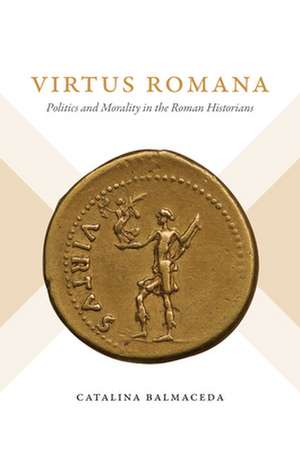Virtus Romana: Studies in the History of Greece and Rome
Autor Catalina Balmacedaen Limba Engleză Paperback – noi 2021
Tracing how virtus informed Roman thought over time, Catalina Balmaceda explores the concept and its manifestations in the narratives of four successive Latin historians who span the late Republic and early Principate: Sallust, Livy, Velleius, and Tacitus. Balmaceda demonstrates that virtus in these historical narratives served as a form of self-definition that fostered and propagated a new model of the ideal Roman more fitting to imperial times. As a crucial moral and political concept, virtus worked as a key idea in the complex system of Roman sociocultural values and norms that underpinned Roman attitudes about both present and past. This book offers a reappraisal of the historians as promoters of change and continuity in the political culture of both the Republic and the Empire.
Preț: 269.44 lei
Nou
Puncte Express: 404
Preț estimativ în valută:
51.56€ • 53.97$ • 42.91£
51.56€ • 53.97$ • 42.91£
Carte tipărită la comandă
Livrare economică 31 martie-14 aprilie
Preluare comenzi: 021 569.72.76
Specificații
ISBN-13: 9781469668628
ISBN-10: 1469668629
Pagini: 312
Dimensiuni: 156 x 234 x 19 mm
Greutate: 0.48 kg
Editura: The University of North Carolina Press
Seria Studies in the History of Greece and Rome
ISBN-10: 1469668629
Pagini: 312
Dimensiuni: 156 x 234 x 19 mm
Greutate: 0.48 kg
Editura: The University of North Carolina Press
Seria Studies in the History of Greece and Rome
Descriere
Tracing how virtus informed Roman thought over time, Catalina Balmaceda explores the concept and its manifestations in the narratives of four successive Latin historians who span the late Republic and early Principate: Sallust, Livy, Velleius, and Tacitus.














